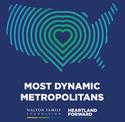Today, the Walton Family Foundation released “The Most Dynamic Metropolitans,” new research ranking the economic performance of metropolitan areas in the Heartland and across the country. The study demonstrates that a knowledge-based economy spurs economic growth in metropolises across the United States. Metro areas with knowledge-based economies ranked higher than cities that have yet to make much-needed investments in technology, education, entrepreneurship and commercialization. read more »
Geography
New Metropolitan Rankings Show Knowledge-Based Industries and Entrepreneurship Drive Success
- Login to post comments
Obstacle Course
I was in Atlanta last month and was encouraged to poke around by the people who invited me. For my entire life the greater Atlanta metroplex has grown in population, geographic size, economic importance, and cultural relevance. As the locals like to remind everyone, Hartsfield-Jackson is the busiest airport in North America. Half the people I went to school with in New Jersey in the 70s and 80s migrated to places like Atlanta for all the usual reasons. read more »
- Login to post comments
Closing the Gap
China is building a magnetically levitated (maglev) train that will “fill the gap between high-speed rail and air transportation,” says CNN. This new train may have a top speed of 370 miles per hour, which “could narrow the gap between high-speed rail and air travel,” says Republic World. read more »
- Login to post comments
From Madera and Joplin to New York: Dispersed, Not Dense Urban Areas Dominate GDP
For some time, the mainstream press and conventional urban planners have been obsessed with a “dense urban” narrative. This is largely a myth, as has been demonstrated by resurgent growth in suburbs and exurbs. read more »
- Login to post comments
Peer-to-Peer Carsharing: A Peek Under the Hood
While the media tends to studiously report – and often sensationalize – the latest developments involving Airbnb, e-scooters, and ride-hailing (especially Lyft and Uber), another booming “sharing economy” sector has recently been gaining attention. Peer-to-peer carsharing enables individuals to make their privately-owned vehicles available to others for short periods of time at a fee of the owner’s choosing. read more »
- Login to post comments
Europe’s Overlooked Suburbs: Key to EU Election?
In the run-up to the elections for the European Parliament, The Economist magazine suggests that the old political divisions no longer apply (“Between somewhere and anywhere: The politics of suburbia in Europe,” May 11, 2019). As the chaos of a British Parliament is unable to meet its self-defined Brexit deadline, The Economist observes that “Culture wars have taken hold of European politics and eclipsed the old left-versus-right distinction,” suggesting that the traditional majority social democrats and Christian democrats could find themselves outnumbered after the election: read more »
- Login to post comments
Transit in Los Angeles: Lost Opportunities
Low fares and more bus service, rather than urban rail, is the key to improving transit ridership in Los Angeles. That conclusion can be easily drawn from a recent installment of transportation consultant Thomas A. Rubin and Professor James E. Moore II in their series on transit in Los Angeles. This article covers Improving Bus Service and Reducing Fares have Greatly Increased Transit Use in Los Angeles as part of a series entitled A Critical Review of Los Angeles Metro’s 28 by 2028 Plan being published by the Reason Foundation and its earlier installments were covered in a previous New Geography article. read more »
- Login to post comments
Denver’s Subsidized Housing Scheme Gets It Wrong On Affordability
Thanks to an urban-growth boundary, Denver has a housing affordability problem. Apartment rents have increased by 65 percent in the last decade, while the nationwide cost of living in that time rose by just 18 percent and rents nationwide increased by an average of 28 percent. read more »
- Login to post comments
The Fabric of Character
Our world is changing faster than ever before. As our relationships to work, place, information, place, and most importantly, each other, have massively shifted, we are stuck in an uncertain place yearning for a common ground. Can fostering character formation in these uncertain times spark meaningful change in people's lives? read more »
- Login to post comments
The Nation’s Worst Transit Agencies
The Antiplanner has often called San Jose’s Valley Transit Authority (VTA) the nation’s worst transit agency (with some competition from DC Metro). It would be nice, however, to confirm that with hard data. The question is what are the best ways to measure agency performance? read more »
- Login to post comments





















